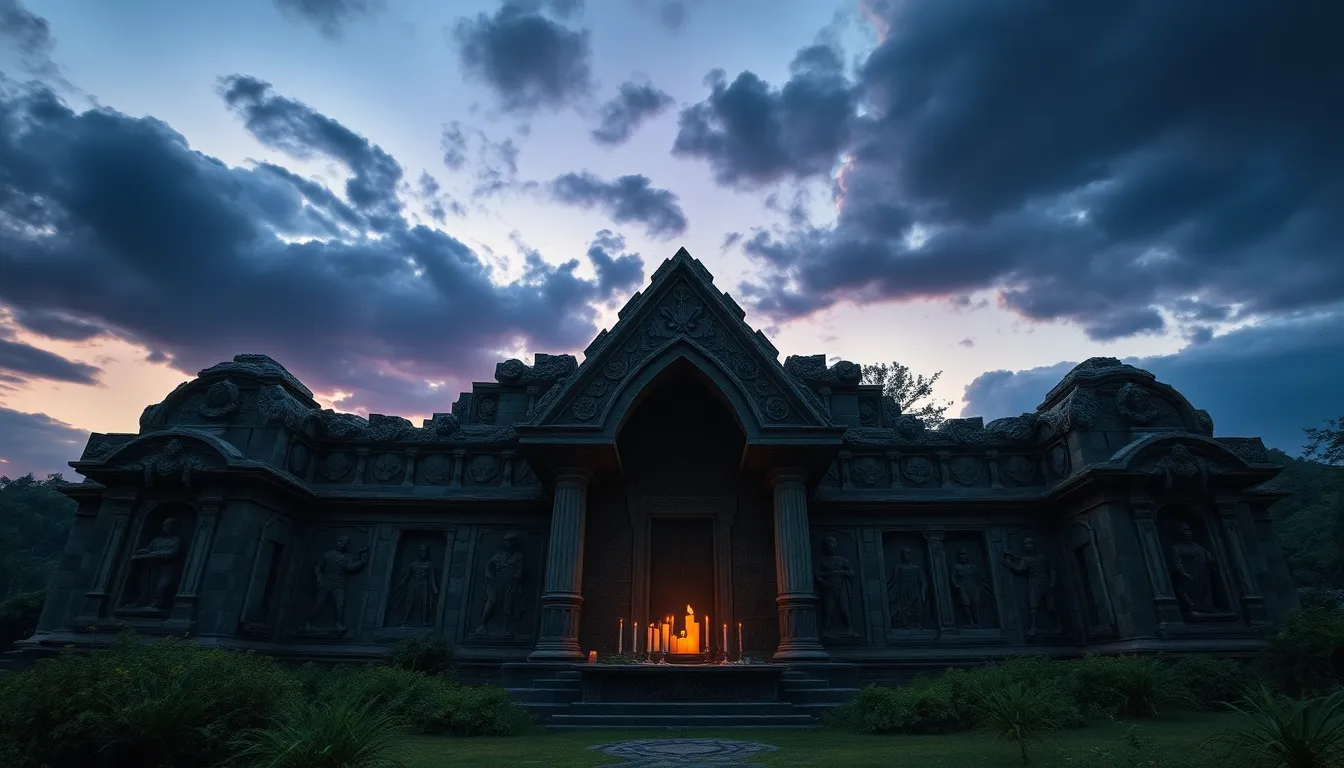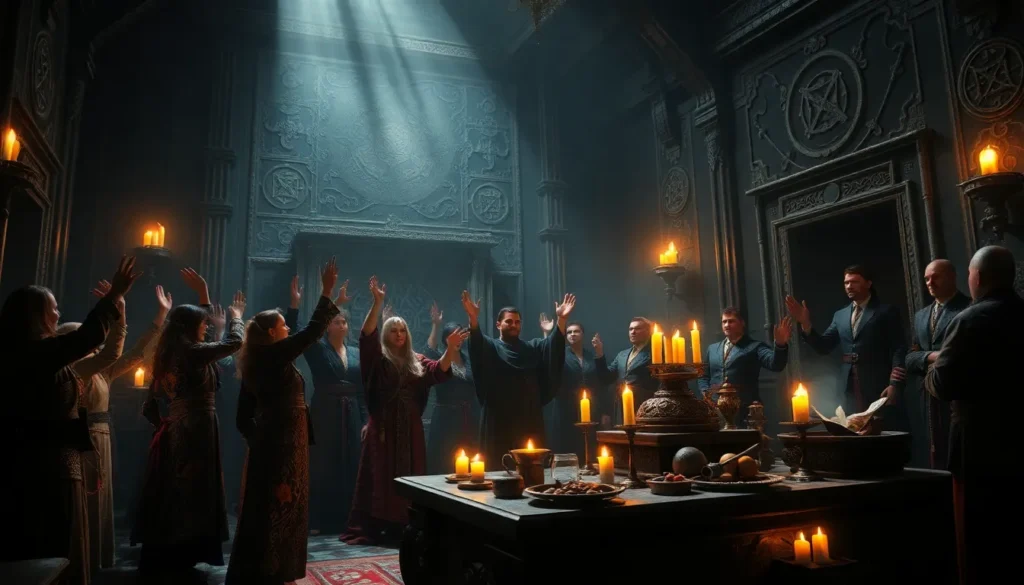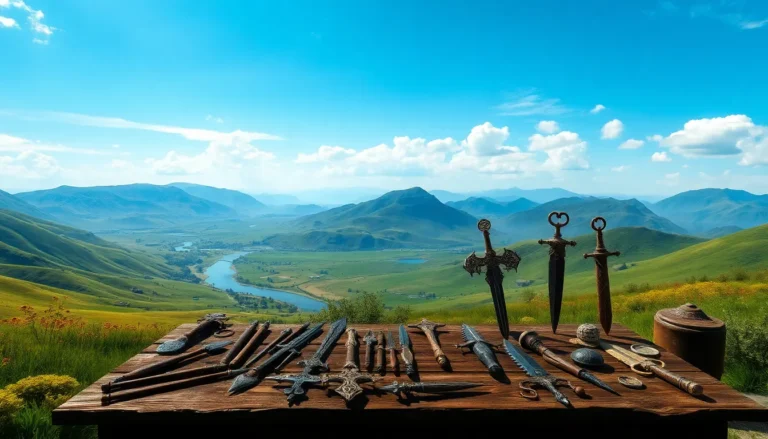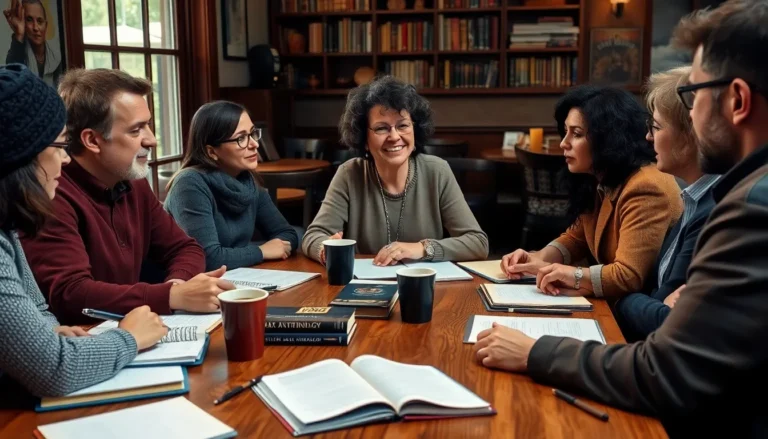Table of Contents
ToggleIn the vast realm of Tamriel, where dragons soar and magic flows like a fine wine, one might wonder about the peculiar practices of Oblivion Daedra worship. Picture this: a group of enthusiastic mortals, decked out in their finest robes, chanting to beings who thrive on chaos and mischief. It’s like a cosmic game night, but instead of Monopoly, they’re rolling the dice with fate itself.
Overview of Oblivion Daedra Worship
Oblivion Daedra worship encompasses a complex array of practices centered around the veneration of Daedric princes. Mortals engage in rituals, often showcasing elaborate robes and symbols associated with their chosen Daedra. Worship involves chanting, offerings, and ceremonies designed to attract the attention of these chaotic entities, known for their unpredictable behavior.
In various cultures throughout Tamriel, followers express their devotion through sacred texts and mythological tales. Daedric artifacts play a crucial role in attracting the favor of the Daedra. These items, often imbued with powerful enchantments, serve as focal points during ceremonies. Temples dedicated to Daedric princes provide sacred spaces for worship, each reflecting the distinct characteristics of the entity it honors.
Certain Daedra, like Azura and Mehrunes Dagon, possess widespread popularity among devotees. Azura, for instance, symbolizes duality and prophecy, attracting followers seeking enlightenment. Mehrunes Dagon, on the other hand, embodies chaos and destruction, appealing to those who desire power or change.
Rituals vary significantly depending on the Daedra being worshiped. Some practitioners engage in elaborate festivals filled with music, dance, and dramatic storytelling. Others opt for quieter, introspective ceremonies focused on meditation and personal reflection. Followers, despite their different approaches, often believe that their actions resonate with the divine beings they honor.
Ultimately, Oblivion Daedra worship remains an essential aspect of Tamrielic culture, intertwining personal beliefs with the chaotic nature of the Daedra themselves. Those who follow this path navigate a world filled with mystery, danger, and opportunity in their quest for divine favor.
Historical Context

Oblivion Daedra worship has deep roots in Tamriel’s varied cultures and histories. This practice intertwines spirituality and chaos, reflecting beliefs about the cosmos and the nature of power.
The Role of Daedra in Tamriel
Daedra embody dynamic forces that influence the lives of mortals. Throughout history, these entities represent the unpredictable aspects of existence. They often serve as guides or adversaries, shaping events across Tamriel. Many mortals believe that engaging with Daedra offers unique insights or favors. The blend of reverence and caution defines mortal interaction with these beings, with worshippers seeking both wisdom and protection.
Notable Daedric Princes
Several Daedric princes stand out due to their distinct philosophies and domains. Azura, revered for her role in prophecy and twilight, inspires followers to seek balance. Mehrunes Dagon, known for chaos and destruction, draws those attracted to power and upheaval. Each Daedric prince has unique rituals associated with them, reflecting their characteristics. For instance, festivals honoring Dagon often feature wild celebrations, while veneration of Azura includes quiet reflection. Temples dedicated to these princes provide sacred spaces for engaging with their divine essence.
Rituals and Practices
Oblivion Daedra worship incorporates various rituals and practices aiming to attract the attention of Daedric princes. Worshippers engage in unique methodologies reflecting their devotion and the intrinsic nature of the Daedra.
Common Worship Methodologies
Ceremonies often involve elaborate chants and the recitation of sacred texts. Participants perform specific dances, showcasing movements that resonate with the energies of their chosen Daedra. Gathering in temples dedicated to individual princes, followers utilize symbols representing various Daedric entities. Circles of worshippers might form, creating an energetic atmosphere that enhances their connection to the chaotic forces. Influences from regional cultures shape these practices, giving them distinct flavors while maintaining a core element of reverence.
Offerings and Sacrifices
Devotees present offerings to gain favor from the Daedra. Common items include rare artifacts, valuable gemstones, and significant personal items. Sacrifices often involve the ritualistic shedding of blood, intended to please the unpredictable beings. Followers might also dedicate their time to crafting intricate sculptures or paintings representing their devotion. These offerings vary, reflecting individual beliefs and the characteristics of the Daedric prince in question. Engaging in these practices highlights the personal connection mortals seek with the entities they revere.
Cultural Impact
Oblivion Daedra worship significantly shapes cultural practices across Tamriel. Different regions exhibit unique expressions of reverence toward Daedric princes.
Daedra Worship in Various Regions
Worship of Daedra varies widely throughout Tamriel’s regions. In Morrowind, the Tribunal Temple recognizes the Daedra’s influence, leading to a complex relationship with various Daedric entities. Nords in Skyrim view Daedric worship with suspicion, associating it closely with danger and chaos. Cyrodiil often sees more neutral or even favorable views toward Daedra, particularly among those who affiliate with the cults. Each region incorporates local customs and beliefs into their rituals, demonstrating a diverse landscape of Daedric veneration that reflects cultural attitudes.
Influence on Society and Law
Daedra worship affects societal norms and laws across Tamriel. Communities may enact regulations that permit or restrict Daedric practices based on cultural perceptions. Imperial law recognizes Daedric worship but often discourages more extreme rituals. In contrast, certain factions openly embrace these practices, integrating them into daily life and governance. This blend of acceptance and wariness illustrates the ongoing tension surrounding Daedra, shaping everything from religious institutions to law enforcement.
Ethical Considerations
Oblivion Daedra worship raises multifaceted ethical questions. Practitioners often grapple with the morality of venerating entities known for chaos and avarice. Worshiping Daedra can invoke varying perceptions of right and wrong, influenced heavily by regional beliefs and traditions. For some, seeking power and influence from these beings carries significant moral weight, as it may conflict with established societal norms. In contrast, others argue that devotion to Daedra fosters a deep exploration of personal beliefs, allowing followers to challenge conventional morality.
Morality of Worshiping Daedra
Worshiping Daedra evokes a complex moral landscape. Many view it as a transgressive act, inherently linked to chaos and destruction. Followers could navigate their beliefs with caution, understanding that devotion entails risk and unpredictability. Cultural context significantly shapes perceptions; for instance, Morrowind’s nuanced views contrast sharply with Skyrim’s outright suspicion. Various ethical dilemmas arise, including the potential compromise of one’s values in pursuit of power. Seeking favor may involve choices that challenge accepted morality, compelling practitioners to reflect on their commitments and values.
Consequences of Worship
Consequences of Daedra worship can surface in numerous ways. Communities often respond to such practices with a blend of reverence and fear. Engaging in rituals may draw the attention of Daedric entities, leading to unintended repercussions. Devotees may experience personal transformations, which can alter their relationships and reputations within society. Local legislation may reflect a spectrum of acceptance, ranging from outright prohibition to formal recognition. Additionally, extreme practices, such as blood sacrifices, can provoke backlash from authorities or neighboring factions. Ultimately, practitioners navigate a delicate balance between their desires and the wider implications of their faith.
Oblivion Daedra worship remains a fascinating aspect of Tamrielic culture. It embodies a complex relationship between mortals and powerful entities. Through rituals and offerings, worshippers seek connection and understanding from the chaotic forces that shape their lives.
The diverse expressions of this worship across regions highlight the varied perceptions of Daedra. While some embrace these practices as a path to personal power and insight, others view them with caution and skepticism. This ongoing tension illustrates the delicate balance between reverence and fear.
Ultimately, Oblivion Daedra worship invites individuals to explore deep philosophical questions about morality and the nature of existence. As practitioners navigate their beliefs, they contribute to the rich tapestry of Tamriel’s spiritual landscape, forever influenced by the enigmatic presence of the Daedric princes.







